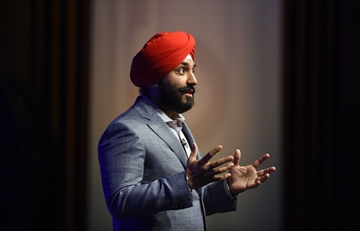WATERLOO — A slow-growth economy does not have to be Canada's destiny, and with the right plan this country can outperform the rest of the world, Navdeep Bains, the federal minister of innovation, science and economic development, says.
"In the past we relied on increased trade and high commodity prices to boost our economy, and we also relied on more people joining the workforce as well," Bains said Thursday during a keynote speech at the Waterloo Innovation Summit.
"But those options are no longer enough," Bains said in the speech at the University of Waterloo. "Today our economy faces new pressures."
Global companies are now local competitors as technology transforms work, play and education, he said. And the number of working-age people is shrinking and climate change demands different ways of meeting energy needs, he said.
"In the face of these challenges, low growth does not have to be our destiny," Bains said. "We do not have to accept these pressures as limitations. We can see them as opportunities and seize the future."
In the coming months, the Liberals will ask for expressions of interest from technology leaders for funding for strategic investments. Ottawa will be looking for the best opportunities for investments that drive innovation across different industries, Bains said.
"We have heard from Canadians that targeted, high-value investments will have greater impacts," he said. "That means we need to make strategic choices and we need to be guided by leaders like you."
Canada's economy is now ranked 22nd for business spending on research and development among the world's 34 advanced nations. With the right plan, one the Liberal government calls The Innovation Agenda, Bains said Canada can do better than any other country.
"Our vision is to make Canada a global centre for innovation, and our mission is to create good paying jobs that will grow the middle class," Bains said. "That's because Canada only thrives when the middle class thrives."
After winning the seat for Mississauga-Malton last year, Bains was appointed the country's first federal minister of innovation. The former adjunct lecturer at the University of Waterloo held 28 roundtable consultations across the country this summer to help prepare the government's Innovation Agenda.
"In total, we received more than 1,300 ideas on how to make Canada a global leader in innovation," Bains said.
Some of those ideas will make their way into the 2017 budget, he said.
The government identified three themes during its consultations — talent, financial support for promising startups that can scale, and diversity.
On talent, more people are needed in science-technology-engineering-math (STEM) programs, Bains said. More women, young people and indigenous people need to participate in the innovation economy.
"No country can afford to leave half of its brain power on the sidelines, it just makes no sense," Bains said. "And yet today, less than one in three computing and engineering graduates is a woman. That is just not good enough."
Promising startups need to scale into global markets because the Canadian market alone is not big enough, Bains said. He said the federal government can help by buying products and services from those startups.
"We can set aside a portion of our resources for startups with the most innovative solutions," he said. "We can provide these high-potential companies with the testing ground they need to refine their products and services."
Governments can a play a key role in driving innovation, he said. Nanotechnology, biotechnology and renewable energy exist today because government funded early stage research, he said.
Since taking power last fall, the Liberals say they have invested $2 billion in college and university campuses, and $900 million in support of cutting-edge research.
"One of those projects is right here at this university, our investment of $76 million will allow a prototype of a quantum computer to be built," Bains said, referring to the recent announcement of funding for research at the Mike & Ophelia Lazaridis-Quantum-Nano Centre.
Quantum computing could upend the science of computing and be a direct pipeline to the next, big breakthrough in technology, he said. "It could even plant the seeds for the next great companies to come right here from this region."
From 1961 to 2000, the economies of advanced countries expanded by an average of 2.5 per cent. Since 2000, growth has slumped to one per cent or less, David Fransen, chair of the Waterloo Innovation Summit, said in his welcoming remarks.
"It is a real problem and it is one that does not seem to be going away very quickly," Fransen said.
The Waterloo Innovation Summit is a partnership between UW and Communitech.






